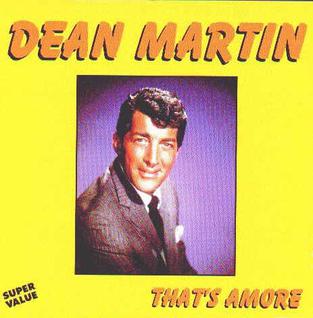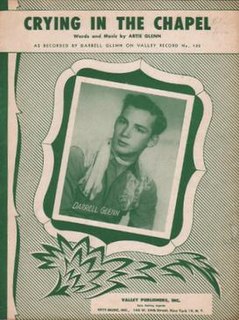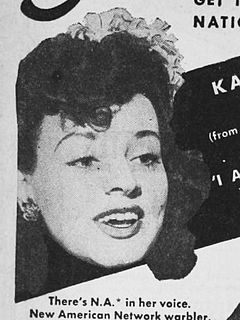The Billboard Hot 100 is the music industry standard record chart in the United States for songs, published weekly by Billboard magazine. Chart rankings are based on sales, radio play, and online streaming in the United States.

"That's Amore" is a 1953 song by composer Harry Warren and lyricist Jack Brooks. It became a major hit and signature song for Dean Martin in 1953. Amore means "love" in Italian.
"You Always Hurt the One You Love" is a pop standard, with words by Allan Roberts and music by Doris Fisher. It has been performed by many artists over the years, including Moon Mullican with Cliff Bruner, The Mills Brothers, Connie Francis, Fats Domino, The Impressions, Molly Nilsson, George Maharis, Frankie Laine, Richard Chamberlain, Peggy Lee, Maureen Evans, Michael Bublé, Kay Starr, Hank Thompson, Ringo Starr, Molly Nilsson, and Clarence "Frogman" Henry, whose version became a top 20 hit on the Billboard Hot 100 in 1961. It was also popular in a parody version by Spike Jones. The song was performed by Ryan Gosling and featured prominently in the 2010 film Blue Valentine.
"Little Things Mean a Lot" is a popular song written by Edith Lindeman (lyrics) and Carl Stutz (music), published in 1953. Lindeman was the leisure editor of the Richmond Times-Dispatch, and Stutz, a disc jockey from Richmond, Virginia. Stutz and Lindeman are also known for writing Perry Como's 1959 hit, "I Know".
"Why Don't You Believe Me?" is a popular song written by Lew Douglas, King Laney, and Roy Rodde and published in 1952.
"No Other Love" is a show tune from the 1953 Rodgers and Hammerstein musical Me and Juliet.
"Don't Let the Stars Get in Your Eyes" is a country song about a man away from home who's worried that his paramour may unwittingly stray from their relationship. The song was recorded in many different styles by many artists. It was written by Winston L. Moore and was published in 1952.
"The Song from Moulin Rouge" is a popular song that first appeared in the 1952 film Moulin Rouge.
"Bell Bottom Blues" is a popular song.

"Vaya con Dios " is a popular song written by Larry Russell, Inez James, and Buddy Pepper, and first recorded by Anita O'Day in December 1952. Les Paul and Mary Ford had a No. 1 recording of the song in 1953. Members of the Western Writers of America chose it as one of the Top 100 Western songs of all time.
"Cry" is the title of a 1951 popular song written by Churchill Kohlman. The song was first recorded by Ruth Casey on the Cadillac label. The biggest hit version was recorded in New York City by Johnnie Ray and The Four Lads on October 16, 1951.
"The Gypsy" is a popular song written by Billy Reid, and published in 1945. The ballad tells the story of a person who visits a Gypsy fortune teller and is reassured that their partner is faithful. Though they both know it to be untrue, the narrator resolves to return, "'Cause I want to believe the Gypsy".

"Crying in the Chapel" is a song written by Artie Glenn for his son Darrell to sing. Darrell recorded it while still in high school in 1953, along with Artie's band the Rhythm Riders. The song was rejected by Hill and Range Songs and Acuff-Rose Music. The song was eventually published by Valley Publishers which also released the single featuring Darrell Glenn. It became a local hit and then it went nationwide. The original version of the song was issued in May 1953. The song became one of the most covered of 1953. Darrell Glenn's original recording reached number one on the Cash Box charts and number six on Billboard. Darrell Glenn's original version also hit number six on the Billboard pop singles chart and number four on the Billboard country and western chart, Rex Allen's number eight, Ella Fitzgerald number 15, and Art Lund reached number 23.

"Crazy Man, Crazy" was the title of an early rock and roll song written by, and first recorded by Bill Haley & His Comets in April 1953. It is notable as the first recognized rock and roll recording to appear on the national American musical charts, peaking at #12 on the Billboard Juke Box chart for the week ending June 20, 1953, and #11 for two weeks on the Cash Box chart beginning for the week of June 13. It is also believed to be the first rock and roll recording to be played on national television in the United States. The use of a comma in the title varies from source to source, but is present on the original single release, which is credited to "Bill Haley with Haley's Comets," an early variant of the band's name.
"I Forgot More Than You'll Ever Know" is a number one country music single for The Davis Sisters in 1953. The song, written by Cecil Null, was the first hit for the duo of Skeeter Davis and Betty Jack Davis and their only one as Betty Jack was killed in an automobile accident the week the record was released.
"(Now and Then There's) A Fool Such as I" is a popular song written by Bill Trader and was published in 1952. Recorded as a single by Hank Snow it peaked at number four on the US country charts early in 1953.
"Hey Joe" is a 1953 popular song written by Boudleaux Bryant. It was recorded by Carl Smith for Columbia Records on 19 May 1953 and spent eight weeks at #1 on the US country music chart. This marked Bryant's first number-one record. He later wrote songs with his wife Felice for The Everly Brothers.
"Such a Night" is a popular song from 1953, written by Lincoln Chase and first recorded by The Drifters.
"Make Love to Me" is the title of a 1954 popular song with words and music written by a larger team than normally is known to collaborate on a song: Bill Norvas, Alan Copeland, and the New Orleans Rhythm Kings, comprising Leon Rappolo, Paul Mares, Ben Pollack, George Brunies, Mel Stitzel, and Walter Melrose. The melody was derived from a 1923 song, "Tin Roof Blues", composed by the New Orleans Rhythm Kings.





